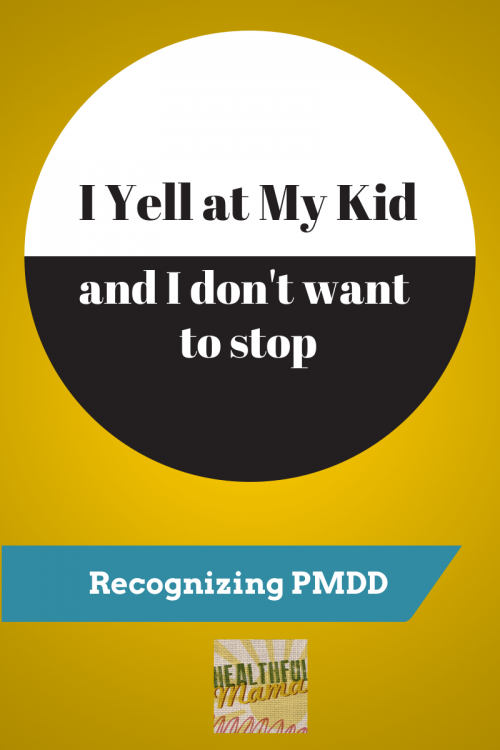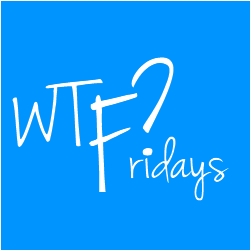
“You need to leave Mom alone, RIGHT NOW.” I could feel my anger building, once again, towards my three-year-old. I knew he could sense my frustration and instead of retreating, he clung closer to me in order to feel secure. His ploys for attention, his climbing on me, his slaps were all because he wanted to know things were okay with Mommy. I understood that. However, the tightness gripping my abdomen and throat pushed screams from me.
“THAT IS NOT OKAY! YOU CANNOT DO THAT! GO OUT OF THIS ROOM!” I gruffly brought him to his own room because I feared what might happen next. “YOU NEED TO STAY AWAY FROM MOMMY FOR A FEW MINUTES.” I didn’t want to hurt him. My son burst into tears because I was literally pushing him away. I don’t even know what I was yelling about, what he did or didn’t do, nor what made me so.friggin.mad. And I didn’t care.
All I knew was that I wasn’t going to stop–that I DIDN’T WANT TO STOP–until he felt the intensity of my rage.
 image via flickr
image via flickr
That scared the shit out of me.
You see, we weren’t just having a bad day. This was a monthly, if not bi-monthly occurrence that happened before my period. While many women might get irritable, tired, or feel down with PMS, I experienced uncontrollable rage over the tiniest things: “TOOTHPASTE CAP LEFT OFF THE TUBE?! WHY IS THERE A SOCK LAYING HERE?! THIS HOUSE IS A WRECK!!!”

My husband bore the brunt of my outbursts but our son caught some of my anger if I couldn’t rein it in on any given day. Like clockwork, the week before my period consisted of a few days of intense anger, followed by a crash akin to the first trimester of pregnancy, and then usually on-and-off crying. Once my period started, I’d have one day of severe lethargy, but then I’d be back to normal–whatever that is.
We often hear news stories of people hurting their loved ones, or we witness it in public–people berating their children or spouse until they feel just as badly as the deliverer seems to feel. And we ask, “How could anyone do treat a person that way?” I feel like I reached a place where I was identifying more with the people at whom we shake our heads than with those who do the head shaking. This is not to say I was physically hurting my family, but I found myself thinking, “Oh, I see how they get to that point…” When I told my husband I was ready to see a doc and find out what was going on with my body, the excited relief in his eyes told me things were worse than I thought.
I first learned of Premenstrual dysphoric disorder (PMDD) in the late 90’s. Prescription drugs were newly-approved to appear in television ads, in magazines, and on the radio. One radio ad, for a drug called Serafem, described the symptoms of PMDD: “The week before your period, do you feel irritability? Tension? Tiredness?” I asked no one in particular, “Isn’t that just PMS?” Every woman I knew got PMS, and it just seemed like something one dealt with in the Plight of Womanhood. In fact, as a late-bloomer, I was so glad to finally have something in common with womankind that I ignored any idea that PMDD could be my reality or my future.
Serafem television commercial:
The A.D.A.M Medical Encyclopedia defines premenstrual dysphoric disorder as “a condition in which a woman has severe depression symptoms, irritability, and tension before menstruation.” Reading further, symptoms are described more specifically: “no interest in daily activities or relationships, fatigue, feeling of sadness, feelings of tension or anxiety, feeling out of control, food cravings, mood swings with periods of crying, panic attacks, irritability or anger that affects others, physical symptoms, such as bloating, breast tenderness, headaches, and joint or muscle pain, problems sleeping, trouble concentrating.” (source)
Besides the Serafem ad (which, coincidentally, was pulled from tv by the FDA for inaccurately representing PMDD), my only other encounter with PMDD was a fashion-magazine article I read in college, in which a woman recounted her PMS rage: she had slammed her hands on and broke the steering wheel of her car. “Surely, I can’t have PMDD,” I thought, “I’m not breaking mechanical equipment.”

Fifteen years later, I sit in the doctor’s office. We’re discussing my latest blood work, which showed, to my doc’s suspicion, that everything within me is functioning relatively fine. It’s time to address my monthly mood swings. My doc diagnoses me with PMDD, with a possible side-dish of depression, but both are treated with anti-depressants. With a sigh, I say I’m prepared to “go back on” antidepressants after knocking them, and most prescription drugs, for years. I’d taken antidepressants for a short time in 2007, but went on a natural health kick not long after, and I’d sworn off synthetic medications for the last six years. I’d spent a lot of time building a gigantic barn for my extremely high horse. But I know all the St. John’s Wort, other herbal supplements, essential oils, yoga, and deep breathing hadn’t helped me, and weren’t going to help me. I needed the hard stuff. My doctor calmly states, “My recommendation for this is Prozac…”
I had an immediate, tearful reaction. Prozac. Prozac? Isn’t Prozac for people who are REALLY depressed? Isn’t Prozac for when you have SEVERE symptoms? Isn’t Prozac for CRAZY PEOPLE–with REAL PROBLEMS?!
Prozac commercial:
Now, listen, I have enough education about mental health to know that these thoughts weren’t rational nor fair, and I know quite a few people who take Prozac, but in the moment, my mind flipped back to those early commercials for the drug–the ones with people seemingly on the brink of suicide before The Miracle of Prozac helped them out of the darkness. I didn’t WANT to take Prozac. I could barely force myself to say the name of it. My doc is a kind woman, not much older than me, who gently said that I could take something else–she only recommended Prozac because that is the drug used in studies of PMDD. (Ironically, the Serafem I remembered from my youth was simply re-branded Prozac). I faltered, and told her why I was feeling anxious; those drug commercials made a lasting impression, apparently. She remembered them, too, and how drugs, particularly Prozac, were portrayed in pop culture and the media. I’m sure anyone of a certain age recalls the famous memoir, Prozac Nation, as well as the proliferation of spoofs which spurred from Prozac ads.
Still, I couldn’t bring myself to try the Prozac. I was prescribed escitalopram oxalate (branded name: Lexapro) since I had taken it in the past and felt comfortable with it. There has been evidence of success in treating PMDD with escitalopram oxalate. I felt confident this drug might be of some help.
I’m a month into my prescription and things are looking up. A couple of weeks ago, my period was approaching and I felt tense. During my son’s bath time, I reached beside the toilet for a fallen washcloth and realized that someone had knocked over shampoo the night before, leaving a large, sticky puddle behind the toilet. Out of habit, I started to grumble, “Why the hell am I the one who bothers to clean anything?!” But I stopped. I realized, “Hey, this was a mistake. You’re not even actually mad. It could have been any of us. And honestly, the shampoo is probably giving that toilet area a much-needed cleansing.” I cleaned it up and didn’t mention it to anyone.
The following day I had a similar experience. I hadn’t eaten much before picking B up from school, and by the time we got home, it was well past lunchtime. I was firmly in Hangry territory, and I felt myself getting irritated by my son’s complaints and chatter. “Mommy needs to eat something, B. I want to talk to you, but I am not really paying attention until I eat. You can keep talking, but I’m not going to be able to talk until after I’ve had some lunch…”
Huh. This was a departure from, “PLEASE. JUST LET ME MAKE YOUR LUNCH! GO SIT DOWN! GIVE ME A FEW MINUTES TO JUST.DO.THIS. OKAY?!”
The fact that I was not only able to recognize my hunger/anger, but respond to my son in a calm manner was truly a feat I had not been able to perform for months.
In addition to the escitalopram, I’ve been practicing daily yoga, either in class twice weekly, at home, or both. The comments on a video I posted to Facebook recently, in which my son and I were stuck in a traffic jam, dealing with all the frustrations one deals with when a 3-year-old is strapped in an unmoving vehicle, displayed remarks from people who have known me since those early days: “You’ve gotten so calm, Gretch!” My reply?
“Yoga and antidepressants, friends. Yoga and antidepressants.”
It took me awhile to work up the ability to write this. Healthful Mama was born out of a passion for all things natural: remedies, health, food, products. I did a lot of bashing of our medical system and medical professionals. I scoffed at certain lifestyles, at prescription drugs, at food choices. But I’ve been learning, slowly, slowly, slowly, that balance is the key. Choosing a green or natural lifestyle doesn’t have to mean giving up on “better living through chemistry” completely.
I realized, too, that recognizing symptoms in others is easy, but seeing the same symptoms in yourself is usually like trying to see one of those Magic Eye images: you stare and stare and stare and see nothing different about this state of reality until –BOOM!– there it is. “F*ck. That’s me.”
If you are currently struggling with anxiety, depression, PMDD, or any other mental or physical ailment that you just can’t seem to solve or lessen via alternative or natural therapies, I invite you to talk to your doctor or therapist. I look back on my postpartum time, when I was clearly dealing with some mental imbalances, on my relationship issues during that period, on my struggles with work and family throughout my adult life, on the fact that these patterns appeared again and again, and I wonder:
why I didn’t do this sooner?
I flipped through my Instagram feed yesterday and giggled, realizing the discovery I made: a pic from March 1st shows me waiting in the doctor’s office to get the results of my blood work. By April 12th, life was literally Jazz Hands.

Do you think you might be struggling with PMDD? Or are you currently struggling with PMDD or other form of depression/anxiety? How did you or how are you dealing with it?
Note: I have no affiliation with manufacturers of Prozac, fluoxetine, Lexapro, nor escitalopram oxalate. This is a narrative account of my personal experiences with PMDD. This should not be taken as medical advice.



Leave a Reply